Skin Allergy
Home » Conditions » Skin Allergy
Award winning dermatology service, with over 20 years on experience
Short waiting lists, on some occasions offering same week appointments
Safe environment, in Care Quality Commission approved facilities
Skin Allergy Treatments Include:
SKIN ALLERGIES

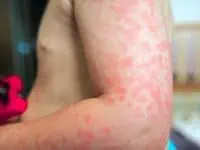
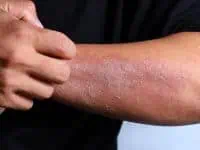

SKIN ALLERGY SYMPTOMS
Indicators of skin allergies can differ, yet typically involve:
- Red and inflamed skin: The area of skin impacted may display signs of inflammation and redness.
- Constant itching: There can be a non-stop compulsion to itch the affected area.
- Skin swelling: Puffiness and swelling may occur on the skin.
- Development of blisters: Blisters filled with fluid may form.
- Appearance of rash: Visible rashes may emerge, often appearing as tiny bumps or welts.
- Dryness and cracking of skin: The skin might turn dry, flaky and may even crack.
- Burning or stinging feeling: Some people might feel a stinging or burning sensation on the impacted area of the skin.
These symptoms could manifest shortly after being exposed to the allergen or they may take a few days to show up.
What are the causes of skin allergies?
Skin allergies are caused by the skin’s reaction to certain substances. Common causes include:
- Metals: Nickel, found in jewelry, belts and zippers, is a common allergen.
- Fragrances: Perfumes and scented products can trigger allergic reactions.
- Preservatives: Chemicals used to preserve cosmetics, lotions and other personal care products.
- Rubber: Latex and other rubber products, including gloves and balloons.
- Plants: Certain plants, like poison ivy, poison oak and poison sumac, can cause allergic reactions.
- Dyes: Dyes used in clothing, hair products and cosmetics.
- Medications: Topical medications, such as antibiotic ointments, can cause skin allergies.
- Cleaning Products: Detergents, soaps and household cleaners may contain allergens.
- Cosmetics: Makeup, lotions and skincare products can contain ingredients that cause allergies.
- Industrial Chemicals: Substances used in manufacturing or construction can be allergens.
Identifying and avoiding the specific allergen is crucial for managing and preventing skin allergy symptoms.
how long does a skin allergy last?
The duration of a skin allergy can vary depending on the severity of the reaction and whether the allergen is still present. Generally, mild skin allergies can last for a few days to a week. If the allergen is identified and avoided, symptoms typically start to improve within a few days. However, more severe reactions may take longer to heal, potentially lasting several weeks.
It’s important to follow medical advice and treatment plans to help manage symptoms and speed up recovery.
PATCH TESTING FOR SKIN ALLERGY
Patch testing is an effective solution for diagnosing skin allergies because it helps identify specific substances that trigger allergic reactions. By applying small amounts of potential allergens to the skin and monitoring the reaction over a few days, healthcare professionals can pinpoint the exact cause of dermatitis or other allergic responses. This targeted approach allows for personalised treatment plans, enabling patients to avoid identified allergens and manage their symptoms more effectively. Additionally, patch testing is non-invasive and highly accurate, making it a reliable method for improving the quality of life for individuals with persistent skin allergies.
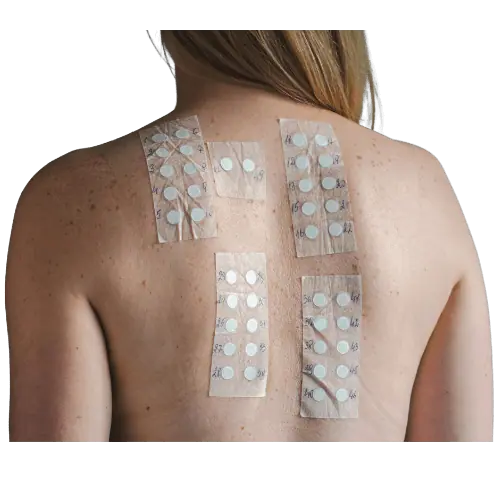
FREQUENTLY ASKED QUESTIONS
HOW CAN SKIN ALLERGIES BE TREATED?
WHY AM I GETTING SKIN ALLERGIES ALL OF A SUDDEN?
REQUEST A CALL BACK
Please fill in this form and one of our team will give you a call back to arrange a consultation with one of our expert dermatologists.
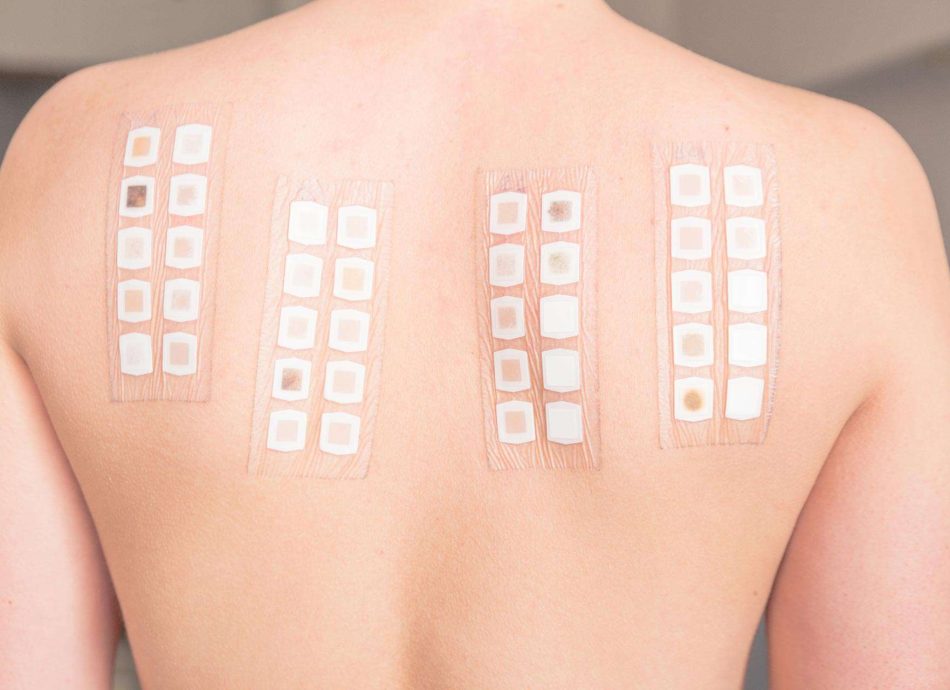
HEAR FROM OUR PATIENTS
WHY TREAT YOUR SKIN ALLERGIES At Stratum DERMATOLOGY CLINICS?
Choosing Stratum Dermatology Clinics for treating your skin allergies ensures you receive expert care from leading specialists in the field. Our clinics are equipped with state-of-the-art facilities and offer comprehensive diagnostic services, including highly accurate patch testing. We are regulated by the Care Quality Commission and are part of the British Association of Dermatologists, reflecting our commitment to high standards of care. Patients highly rate us on Doctify, and both our clinics and consultants are recognised by major healthcare insurance providers. At Stratum Dermatology Clinics, you can be confident in receiving personalised, effective treatment plans tailored to your specific needs, ensuring the best possible outcomes for your skin health.
Latest INSIGHTS AND ADVICE

Guide to Fall Skin Conditions
Autumn, with all its stunning colours, also brings some challenges for our skin. As the air gets cooler and the leaves turn vibrant shades, it’s a reminder that we’re steadily approaching winter. Keeping your skin glowing and healthy during this transition from summer to the
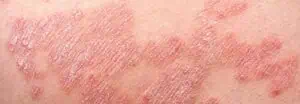
Eczema Awareness Month – Complete Guide on Eczema
October is Eczema Awareness Month. For individuals living with eczema, you will be all too familiar with the trials of handling this skin complaint. It’s our mission throughout October and beyond to educate, support and empower you by delivering invaluable insights on its origin, available

Understanding Varicose Veins: Symptoms, Treatments and Prevention
Varicose Disease Awareness Month focuses on raising awareness about varicose veins, a common but often ignored condition affecting millions globally. This September, we’re highlighting the importance of early detection, available treatments and lifestyle changes to effectively manage varicose veins. By increasing awareness, we aim to